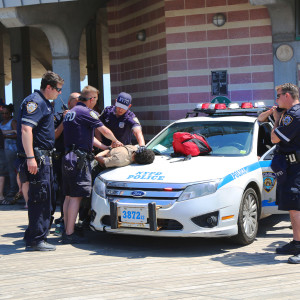Editor’s Note: For an alternative viewpoint, see: Point: ‘Ferguson Effect’ Is Real
In order to believe in the “Ferguson effect” — the idea that police so fear being captured on film misbehaving that they have stopped doing their jobs — you have to have a cynical, and in my view myopic, view of what it means to be a police officer in America in 2015.
The argument for the Ferguson effect is overly simplistic; the argument against it more nuanced. Let’s start with the former, first posed by Heather Mac Donald of the Manhattan Institute in the Wall Street Journal earlier this year:
This incessant drumbeat against the police has resulted in what St. Louis police chief Sam Dotson last November called the “Ferguson effect.” Cops are disengaging from discretionary enforcement activity and the “criminal element is feeling empowered,” Mr. Dotson reported.
Let’s explore this argument. The cornerstone of the petition is that sworn law enforcement officers are failing to execute their duties. The Ferguson effect comes in the wake of the deaths by law enforcement of Michael Brown, Eric Garner, Tamir Rice, Freddie Gray and others while being taken into custody. These high-profile revelations of unarmed civilians dying at the hands of law enforcement are posited to have changed law enforcement behavior. According to Mac Donald, police are simply unwilling to enforce the law today, emboldening criminals to increase the rate of their misbehavior.
There are four possible reasons this story might be true. They paint an ugly portrayal of law enforcement, one which I reject.
First, this notion of the Ferguson effect suggests that police routinely engage in what could be perceived as unlawful behavior. That is, logically, it stands to reason that law enforcement would withhold interventions because they believe those interventions to be unlawful. If police are behaving lawfully, why would they worry about civilian video surveillance? The only reasonable conclusion is that Mac Donald believes that police routinely act unlawfully and are now reticent to continue that behavior — a notion I refuse to believe.
Second, the article suggests that violence post-Ferguson has increased substantially due to the lack of law enforcement engagement. Continuing the same logic, this suggests that law enforcement could and can only be effective if it engages in potentially illicit, unlawful and unconstitutional behavior. Why else would police change their behavior?
This argument has no reasonable merit. Why would an officer who routinely engages in legal behavior stop enforcing the law because other officers engaged in unlawful behavior and were discovered doing so? My 18 years studying crime and justice in America suggest that the overwhelming majority of police in America are women and men motivated by justice, not malevolence. Why would uncovering avarice cause them to avoid justice?
Now the argument becomes slightly more nuanced.
Implicit in Mac Donald’s argument is the claim that the thin blue line, law enforcement, is the only thing separating America from barbarity. That is, the only mechanism preventing mayhem is police rigorously, and apparently radically, enforcing the law. The reality is that there is little evidence that police tactics, whether legitimate or illegitimate, have a strong impact on the overall level of violence.
New York City dramatically increased the number of police in the 1990s and 2000s and implemented draconian stop-and-frisk policies, putting the police in direct conflict with citizens. Many other cities — San Diego, for instance — did neither of those things and experienced the same rate of crime decline. Policing is a factor in curtailing violence, but it is neither the alpha nor the omega.
Finally, the article presumes that violence in America is spiking. There is no current evidence to support that, and some evidence to suggest it is a mirage. Understanding violence in America by monitoring violence in a few cities is like understanding the stock market by following a handful of penny stocks: they are volatile and not a good indicator of overall public health.
Indeed, the last official data released by the FBI show violent crime declined slightly in 2014.
Bottom line: there is absolutely no logical reasoning or empirical evidence to prove that the claim of a Ferguson effect has any merit.

